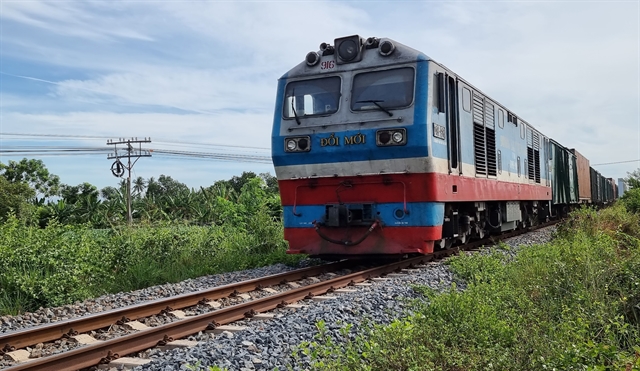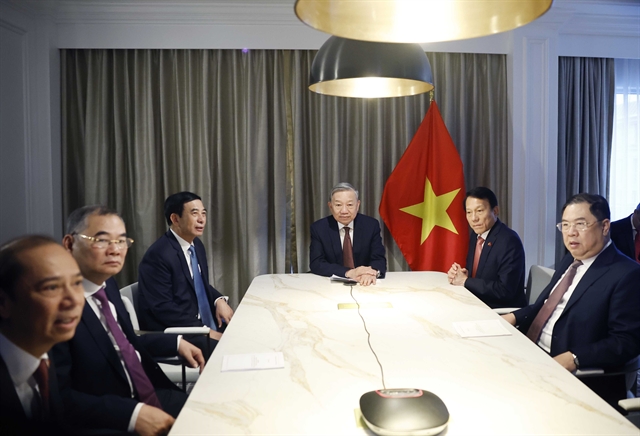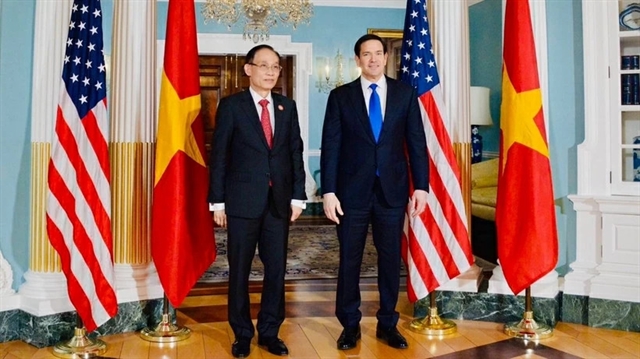 Politics & Law
Politics & Law
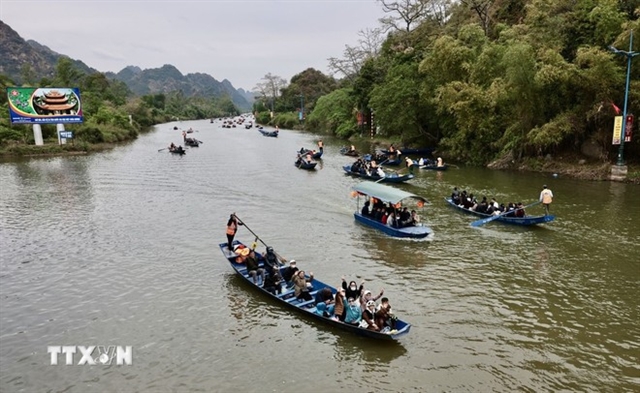
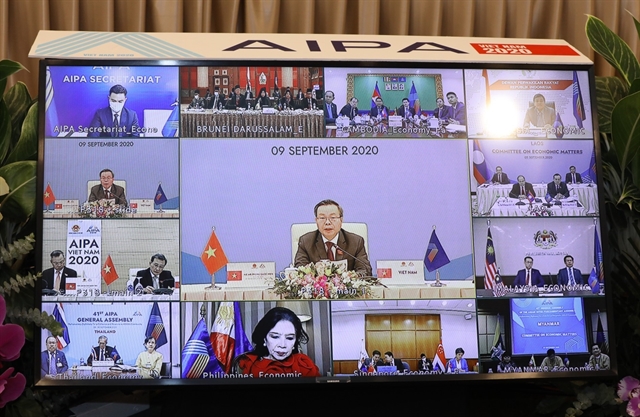
|
| The meeting of the AIPA41's committee on economic matters was held via teleconference on Wednesday morning. — VNA/VNS Photo |
HÀ NỘI — An official of the Vietnamese National Assembly (NA) has suggested continuing to review and perfect the legal framework to promote trade facilitation to ensure uninterrupted circulation of goods and supply chains in the ASEAN region.
Nguyễn Mạnh Tiến, vice chairman of the NA’s Committee for External Affairs, made the suggestion at a virtual meeting of the Economic Committee of the 41st General Assembly of the ASEAN Inter-Parliamentary Assembly (AIPA) on Wednesday.
The meeting focused on the topic “The Role of Parliaments in Promoting ASEAN Cohesiveness and Economic Recovery post-COVID-19”.
Tiến said over the past several months, ASEAN countries have taken their own measures to control the COVID-19 pandemic as well as respond to the economic impacts of the pandemic. However, the COVID-19 pandemic is not just a medical crisis, but a crisis for growth when international trade and supply chains are disrupted.
Facing this situation, the Vietnamese delegation was deeply concerned about the great losses caused by the COVID-19 pandemic in ASEAN countries, he said, adding that the impacts of the COVID-19 pandemic have caused a great hindrance to the economies of ASEAN countries as well as their internal and external trade activities.
Therefore, the economic integration in promoting economic growth and recovery of ASEAN member countries and the good implementation of digital economic activities will be of profound importance, playing an important role in strengthening ASEAN economic integration as well as ASEAN’s readiness to respond to the challenges of the COVID-19 pandemic.
In that spirit, Tiến recommended the ASEAN community to unify to implement a series of breakthrough and feasible solutions.
Firstly, ASEAN must promote accelerated exchange of information relating to tourism and health and other necessary measures to control the spread of the COVID-19 pandemic. The member countries should also promote safety in travelling, applying safety standards and medical procedures to facilitate cross-border movement of ASEAN citizens, and adhere to international health and safety standards as well as commitments under relevant agreements among ASEAN member countries.
Tiến recommended the concept of a "travel bubble" between "green countries" as a preliminary initiative in the process of reopening the border, forming safe travel zones within ASEAN.
ASEAN countries should build open, sustainable and responsible investment policies in the region and speed up the ratification of regional trade agreements and treaties. They should prioritise efforts to finalise negotiations and sign the Regional Comprehensive Economic Partnership (RCEP) by 2020, he said.
Other recommendations proposed by the Vietnamese National Assembly delegation at the meeting included strengthening parliamentary oversight of the implementation of trade and investment commitments within the regional and international frameworks, considering it as a key tool to promote broader economic linkages within the ASEAN Community and between ASEAN and other partners.
Việt Nam also urged building regional connectivity infrastructure, enhancing transport connectivity and fostering co-operation in the Mekong sub-region and other ASEAN sub-regions, especially on environmental protection, smart agriculture development and sustainable management of transboundary natural resources to ensure food, water and energy security in the sub-regions during and after the COVID-19 pandemic.
At the meeting, delegates spoke highly of the Vietnamese NA’s efforts to hold the 41st General Assembly of AIPA via a teleconference as the COVID-19 pandemic is raging in the region and the world.
They discussed measures to mitigate the impacts of COVID-19 while fine-tuning legal frameworks to promote economic recovery when the pandemic is put under control.
The participants affirmed the importance of economic connectivity, including maintaining supply chains, in promoting ASEAN member nations’ economic growth and comprehensive recovery.
They also called for co-operation among AIPA member parliaments in building new legal frameworks to institutionalise national preparedness and response mechanisms against COVID-19 and future pandemics.
A Resolution on the Role of Parliaments in Promoting ASEAN Cohesiveness and Economic Recovery Post-COVID-19 was approved at the end of the meeting.
The same day in a virtual meeting of the Committee on Social Matters, participants discussed challenges brought by COVID-19 for labour, employment, social welfare, culture, education, vocational training, biodiversity, waste treatment and other social matters. They also exchanged experience and know-how applied by their respective countries in tackling the aforementioned matters.
Delegates at the meeting proposed multiple approaches and responsive measures to protect lives and the health of people, as well as the environment, aiming at sustainable development in the region and the world. They affirmed the determination of AIPA member parliaments to support the ASEAN Socio-Cultural Community in responding to COVID-19, ensuring that no one is left behind during epidemic outbreaks and other public health emergencies.
Nguyễn Hoàng Mai, vice chairman of the Vietnamese NA’s Social Affairs Committee, informed delegates about the Vietnamese legislature’s efforts in assisting people through the pandemic.
Specifically, the Vietnamese NA has ensured a legal framework for implementing measures in fighting the COVID-19 pandemic. The NA also approved a support package worth VNĐ62 trillion (US$2.7 billion) to assist people and enterprises affected by the pandemic. It also adjusted the State budget towards promoting public investment and economic recovery. Resolutions on removing obstacles facing enterprises hard hit by the pandemic have also been issued by the NA in a bid to facilitate post-pandemic recovery.
The meeting adopted a draft resolution on “Advancing AIPA’s Role In Supporting ASEAN Socio-cultural Community in Responding to COVID-19”. The final resolution is expected to be approved by the 41st General Assembly of AIPA.
Political Matters
The AIPA member parliaments will make every effort to bolster parliamentary diplomacy and co-operation among states, between the legislative and the executive agencies for promoting regional peace, security, structure and ensuring transparency based on rules and putting ASEAN at the centre.
Deputy Minister of Vietnamese Ministry of Foreign Affairs Bùi Thanh Sơn made the statement at the AIPA41’s meeting on political matters on Wednesday.
While discussing the topic: “Parliamentary diplomacy for sustainable peace and security in ASEAN”, delegates from ASEAN parliaments agreed to continue to maintain peace, security and stability in the South China Sea (called East Sea by Việt Nam).
They highlighted the need to respect the law, build trust, take peaceful solutions based on international laws and fully follow the Declaration on the Conduct of Parties in the East Sea (DOC), UN Convention on the Law of the Sea (UNCLOS), towards the Code of Conduct in the East Sea (COC).
Representatives of the parliaments affirmed their support for improving ASEAN capacity in addressing traditional and non-traditional security challenges and putting people at the core of the bloc, especially in responding to the COVID-19 pandemic.
They also reached consensus on strengthening inter-parliamentary collaboration, including learning from effective methods of regional and international organisations, contributing to the common stability, peace and prosperity.
Report of the political matters’ meeting will be submitted to the plenary session of the 41st General Assembly of AIPA on Thursday. — VNS

